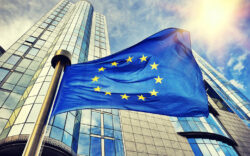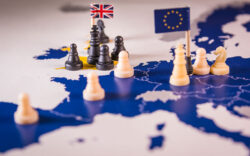It’s getting mighty awkward out there for the green dream believers. And I don’t mean the nature lovers, nor those who believe in energy efficiency or cutting pollution. Which would be all of us – yes, even hay-fever sufferers. No, I’m worried about those who have turned climate change into a crusade with the corresponding religious zealotry. Because things are not going so well for them of late.
Martin Luther as a metaphor
Major fund manager Vanguard has pulled out of the Net Zero Asset Managers (NZAM) alliance. Why? The Financial Times sums up the 95 theses that Vanguard’s nailed to NZAM’s front door:
Vanguard, which mainly manages passive funds that track market indices, said the alliance’s full-throated commitment to fighting climate change had resulted “in confusion about the views of individual investment firms”.
It’s not often people call out overzealousness when it comes to saving the planet…
One of Vanguard’s closest competitors associates is still learning the hard way that green-tinted virtue signalling can now be questioned in public, making it a risky business. The BlackRock CEO Larry Fink was called out for hypocrisy by an investment fund manager called Bluebell, who even called for Fink’s removal!
Bluebell’s argument was that the BlackRock CEO’s awkward blend of environmental and political activism created reputational risk for BlackRock shareholders, which include Bluebell. That is especially because BlackRock doesn’t actually live up to the green talk of its CEO, believe it or not!
Funnily enough, BlackRock fired back that the whole kerfuffle was really because BlackRock had failed to participate in Bluebell’s own ESG initiatives because they were not in the interests of BlackRock’s clients.
In other words, saving the planet has suddenly taken a back seat to client returns at two of the foremost climate change virtue signallers on Wall Street…
Of course, there are always the undercover capitalists in amongst the idealogues, even now. The Australian Financial Review has the story: “Inside the billion-dollar market for junk carbon offsets.” Apparently companies are using the old Catholic method of clearing their conscience: buying indulgences.
Back in the real world, the airline JetBlue is turning its back on carbon offsets and investing in sustainable aviation fuel instead. Yes, there is a change for the actual better!
But why make the shift from outsourcing your guilt by buying indulgences to actual less pollution? A report from Carbon Market Watch discovered, to my very great surprise, that, as Bloomberg carefully put it, “Europe’s leading airlines mislead consumers with claims they can fly guilt-free by using offsets to neutralize the environmental impact of air travel”.
And if the airlines are misleading customers by way of carbon offsets, who else is?
Of course, some pious green zealots remain. Australia’s NRMA insurance company has clearly lost the plot entirely. “Until the climate stops changing” is included in its latest ad. I’m not sure what it refers to, but given the propensity of the climate to change, good luck with that one…
Unless, of course, NRMA believes we can control the climate of the planet… and should…
But even with the zealots in charge of marketing departments, the rest of the world is waking up. The UK government has approved the first coal mine in 30 years, for example.
In fact, the world is so desperate for coal that the EU has loosened its ban on Russian coal to allow for the Ukraine-war-financing and planet-destroying stuff to use EU-based insurance services after all!
I’m not sure what shivering EU citizens think of this, to be honest. The whole “coal for the rest of the world, but not for you” is getting a little too blatant to stomach, if you ask me. Imagine sitting in your cold home, watching the coal shipments go by, on their way to countries that burn them without environmental standards…
Gas out, coal in
Perhaps this explains the recent bout of criminal activity in the European Parliament. That’s according to the secretary general of the Parliament, who found 18 counts of fraud amounting to €2.5 million, 83 thefts amounting to €191,000, and six accusations of “mobbing,” whatever that is.
It was the Russians, no doubt.
Speaking of the devil, chief global investment strategist at Charles Schwab & Co, Jeffrey Kleintop, reckons there is “No Crisis in Europe” as it tries to wean itself off Russian gas. This is a little odd given the evidence he gives for this conclusion:
Natural gas consumption in Germany was down -23% from a year ago in October and down -14% YTD without rationing or a sharp pullback in output.
Now, if you ask me, a 23% drop in natural gas usage is a crisis. Unless, of course, you’re burning vast amounts of coal instead… Say that there had been a 35% increase in coal imports between January and August, for example.
If the statistic had been that natural gas imports from Russia had fallen, but consumption had continued to satisfy demand, then the sanctioneers could declare success. But it turns out that energy-intensive industry in Germany is in decline thanks to power prices. “The de-industralisation of Europe,” they’re calling it. And that’s despite coal trying to save the day.
Funnily enough, the story immediately below Kleintop’s “no crisis” comment on my Twitter feed was about energy rationing beginning in Germany within hours…
Germany Pitch Black
Now it’s happened: the app of a power provider tells people in Germany when they should use how much electricity. Yesterday it already lit up red. The demand: “reduce consumption!”
The article goes on to point out that many businesses are already bust thanks to whopping power bills. And if the government continues on this path, “it’ll be pitch black in Germany. In every sense.”
But what went wrong in Germany to create the crisis? “Not enough electricity,” explained the media, surprisingly. Specifically, northern Germany wasn’t producing enough to ship to the heavily industrialised places further south.
I’m only guessing here, but northern Germany has a lot of wind farms in the North Sea…
And what is true of Germany might apply elsewhere soon, reckons Bloomberg:
“Britain may have to engage in an expensive tug of war with mainland Europe to secure [electricity] imports,” said Glenn Rickson, a power analyst at S&P Global Commodity Insights in London. “It’s the low wind outlook that is the real source of tightness.”
Back to that “uh oh” in a moment. Because it could be worse. At least Europe has the windmills before it shuts down fossil fuels.
Meanwhile, Down Under…
In Australia, engineering contractor Clough has gone bust, putting about A$10 billion in renewable energy projects at risk.
At the same time, Australia is accelerating the closure of coal power plants, and mining giant Glencore has pulled out of a A$2 billion coal mine project. (Of course, the hikes in local royalty rates were only of secondary consideration relative to emissions promises.)
Now, you might be worried about how Australia will generate power without coal and without $10 billion in renewable energy infrastructure. Especially as there is the continued opposition to nuclear power.
But the government already has a solution. There might not be enough coal, but it’ll be cheap thanks to a new price cap… and we all love cheap but non-existent energy, don’t we, Europe?
The Australian government is not the only one capping prices. The EU is keen on price capping Russian oil, and so the Russians are considering a corresponding price floor….
I did expect the Russians to know, better, to be honest. They’ve had the more recent experience with communism’s price controls.
But back to Australia for a moment, because it doesn’t really have the energy shortages which result from mad energy policy… yet. This makes the place very interesting. Australia could still change course given what’s playing out overseas.
The question is, with coal out and renewable project contractors going bust, where will Australia’s electricity come from?
At least the Australian media was honest about the trade-off between green energy and keeping the lights on:
The failure of Clough has added another level of urgency to discussions among energy ministers due to take place in Brisbane on Thursday, regarding reforms to spur investment in infrastructure needed to keep the lights on during the shift to low-carbon energy.
Apparently, you can have lighting or low-carbon energy, but not both.
Will the Australians turn the Titanic in time, or will they end up hitting the iceberg like Europe has done? I don’t know, but the turning circle of energy policy is mighty large, even if you can spot icebergs decades ahead.
Who is powering whom in Europe?
Anyway, it’s not just coal that the UK has done a reversal on. We’re shipping gas to Europe which usually flows in the opposite direction this time of year. This is a bit of a worry because the UK is expected to face gas shortfalls on cold enough days. And, as far as I know, those are quite likely to coincide with cold days in Europe…
Which is ironic because, who’d’ve thought, we also share wind lulls with the rest of Europe too…
And, most shocking of all, wind lulls and cold weather can coincide!
And remember, we may have to send electricity itself to France too. Which doubles the problem given gas is used to create electricity…
It all sounds like the preview to Domino Day, to be honest. I wonder what might happen this winter if there’s a windless cold spell…
Now, if you ask me, interconnectivity is a very good thing. It allows for comparative advantage – the Scandinavians are probably better suited to hydropower than the Dutch, for example. The risk of blackouts is statistically less in a larger grid because a failure large enough to cause a problem is less likely. And I can think of lots of other reasons why sharing a grid is a good thing.
But none of them apply if you aren’t producing enough electricity in the first place. That is because that’s the underlying issue here. There isn’t enough of the stuff. And, as every parent knows, telling your kids to share when there isn’t enough is a recipe for disaster.
Indeed, if you don’t produce enough energy, then all those interconnections start to look like problems. Whopping great awkward political problems…
It’s a bit like sharing a currency, really. It looks good. And sounds good. But once you realise that you’re sharing a monetary policy and exchange rate with economies in completely different situations, which causes financial and economic crises, then it doesn’t look so great anymore. Especially during those crises.
Although I expect the geopolitical drama over the energy mess to get much worse this winter, anyone who experienced the French Revolution, Russian Revolution or Communist China can smell the infighting in the green church more generally too.
Indeed, the whole kerfuffle reminds me of the “Smash Sparrow” campaign under Mao, but that’s another even more morbid story. And not just for the sparrows.
Back in Maoist China, government focused on making people better off instead of the climate. And look how that turned out…

Nick Hubble
Editor, Fortune & Freedom


